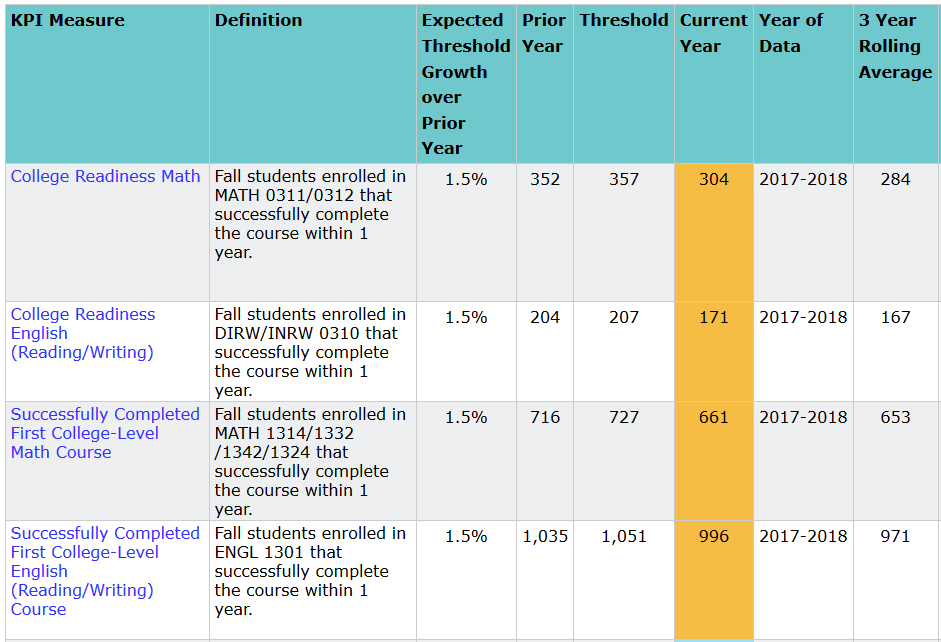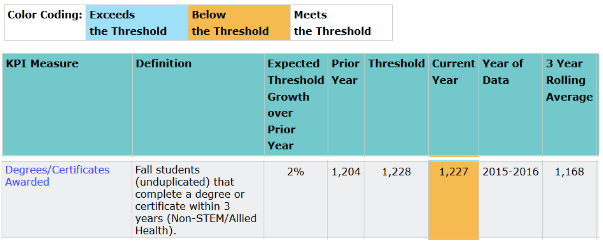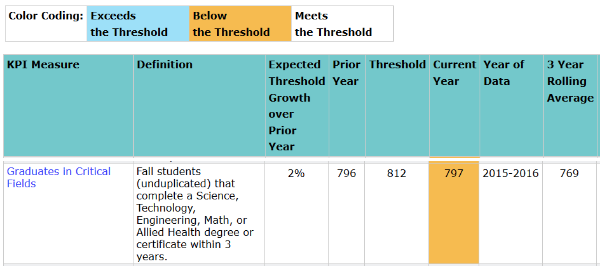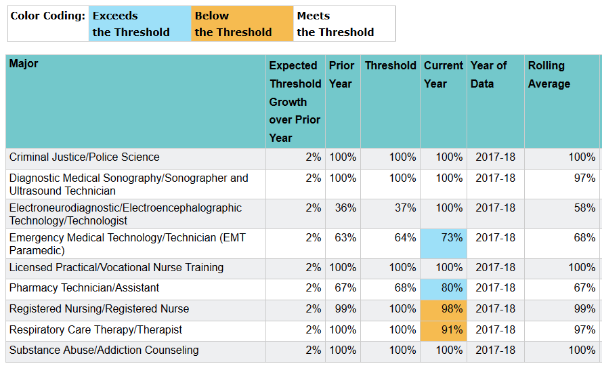Action Plans for Thresholds Not Met
At Risk Students

While each of these measures exceeded the three-year rolling average, they fell below the threshold expected for the year. In an effort to increase the success rates, the College has implemented a co-requisite model for developmental (readiness) courses and first credit level courses. The co-requisite model is supporting these efforts through a Wagner-Peyser grant that focuses on enhancing English and Math co-requisite courses through wrap-around student support and faculty professional development. This grant developed the curriculum towards a contextualized, co-requisite model. This model has students co-enroll in a remedial English course as well was an English college credit level course and/or remedial Math course with a Math college credit level course.
The use of these co-requisite classes has shown that students in these co-requisite courses are out performing their non-co-requisite peers. For example, remedial Math students in co-requisite classes had an average developmental success rate of 73.68% versus their non-co-requisite peers' 64.16% success rate.
The other three measures that were below the identified thresholds are Degrees/Certificates Awards, Graduates in Critical Fields, and Licensure and Certification Pass Rates.
Degrees/Certificates Awarded

The expected 2% growth from the prior year set the threshold to 1,228. ACC awarded 1,227 in the current year, which made the College miss the threshold by one award. The degrees awarded are reviewed each year in multiple ways. The College documents its attempts at improvement in this measure through the Annual Report – College Data, the Performance and Cost Analysis of Credit Programs (PCAC), and the annual program review process. The annual program review process involves the departments collecting and reviewing their annual quality indicators (AQI), which includes awarded degrees, and making decisions based upon the data which are then reviewed by Instructional Leadership. The Annual Report is provided to the departments and the Board annually for review and discussion. The PCAC is generated and provided to the departments and the Board annually for review and decision making.
The College continues to monitor the number of degrees and certificates awarded and in 2018-2019 awarded 1,240 degrees which exceeds the threshold.
Additionally, ACC is a member of two initiatives that focus on streamlining and increasing the number of graduates. These initiatives are the Houston Guided Pathways to Success (GPS)and the Texas Pathways to Success and Retention (Texas Pathways).
Houston Guided Pathways to Success (GPS) is a consortium of two- and four-year colleges in the Gulf Coast region of Texas focusing on post-secondary attainment and success for students. As part of this collaborative partnership, ACC now participates in annual planning and assessment activities focused on increasing completion and transfer rates for students in the region. Houston GPS has allowed the College to focus on strategies to help students succeed, including time to degree completion.
Texas Pathways to Success and Retention (Texas Pathways) is an initiative, sponsored by the Texas Association of Community Colleges (TACC) that focuses on “a comprehensive, statewide five-year strategy to build capacity for Texas community colleges to implement structured academic and career pathways at scale.” A focus of this initiative impacted the College in the following ways; meta-major and key course identification and degree and certificate pathway alignment.
Graduates in Critical Fields
The data are published online and were provided in the Compliance Report for this measure:

The current year’s 797 graduates is one graduate higher than the prior year, but this fell short of the expected threshold growth of 2%. ACC identifies potential graduates in critical fields by tracking the number (unduplicated) of students majoring in the programs and the number of degrees awarded. The College documents improvement in this measure through the College’s Performance and Cost Analysis of Credit Programs (PCAC) and the annual program review process. The annual program review process involves the departments collecting and reviewing their annual quality data, which includes active majors and awarded degrees, and allows them to make decisions based upon the data. These decisions are reviewed by Instructional Leadership. The Annual Report is provided to the departments and the Board annually for review and discussion. The PCAC is generated and provided to the departments and the Board annually for review and decision making. In 2018-2019 ACC reached 896 graduates in critical fields which exceeds the threshold.
Additionally, ACC is a member of two initiatives that focus on streamlining and increasing the number of graduates. These initiatives are the Houston Guided Pathways to Success (GPS) and the Texas Pathways to Success and Retention (Texas Pathways).
Houston Guided Pathways to Success (GPS) is a consortium of two- and four-year colleges in the Gulf Coast region of Texas focusing on post-secondary attainment and success for students. As part of this collaborative partnership, ACC now participates in annual planning and assessment activities focused on increasing completion and transfer rates for students in the region. Houston GPS has allowed the College to focus on strategies to help students succeed, including time to degree completion.
Texas Pathways to Success and Retention (Texas Pathways) is an initiative, sponsored by the Texas Association of Community Colleges (TACC) that focuses on “a comprehensive, statewide five-year strategy to build capacity for Texas community colleges to implement structured academic and career pathways at scale.” A focus of this initiative impacted the College in the following ways; meta-major and key course identification and degree and certificate pathway alignment.
ACC also has an Hispanic Serving Institution (HSI) STEM grant. Through this grant, the College seeks to increase STEM degree completions, particularly among Hispanic/low-income students, by strengthening a key STEM program, Process Technology, to include new active learning strategies and supporting technology.
Licensure and Certification Pass Rates

Two majors were below the threshold based on a 2% growth over the prior year. The majors were Registered Nursing/Registered Nurse and Respiratory Care Therapy/Therapist. Each of these majors, due to the prior year pass rates, had a threshold of 100%. Registered Nursing/Registered Nurse has a current pass rate of 98%, which was 1% lower than the prior year and the rolling average. The pass rate is monitored by the Nursing Department.
The Respiratory Care Therapy/Therapist has a current pass rate of 91%, compared to the 100% prior year and the 97% rolling average. The pass rate is monitored by the Respiratory Care Department with an average of 12 students graduating each year. Because of the cohort size, the pass rate can be impacted by a small number of students.
The College documents improvement in this measure through the annual program review process. The annual program review process involves the departments collecting and reviewing their annual quality data, which includes licensure and certification rates for the appropriate departments. This allows them to make decisions based upon the data. These decisions are reviewed by Instructional Leadership. Additionally, it has been recommended to modify the maximum possible threshold for any licensure or certification major to 95% to allow for growth and avoid capping the threshold at 100%.
